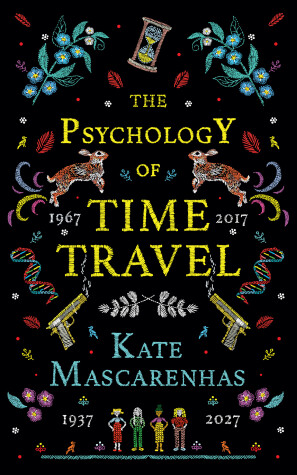Reviewed by Quirky Cat on
The Psychology of Time Travel is the debut novel of Kate Mascarenhas, and believe me when I tell you that it is absolutely worth reading. The novel is being described as perfect for fans of Hidden Figures, which I agree with. It’s one of the most intelligent stories I’ve read about time travel, and I just can’t say enough positive things about it.
At the beginning of the book, Kate Mascarenhas makes a point of talking about her motivation for writing it. She said that she felt that there wasn’t enough of a representation of women, or people of color, in time travel plots. And she’s not wrong. I don’t think it ever really hit me until I read The Psychology of Time Travel, but I have never read something quite like this.
Going back to the Hidden Figures reference – picture Hidden Figures meets time travel - and you’ve got an idea of the tone of this novel. It’s smart and sassy and full of brilliant women of all types. It also tells a story of time travel that I’ve never seen before, and I absolutely adored it.
I went into The Psychology of Time Travel with high expectations, only to have those expectations completely blown away. This novel was so much more than I had ever hoped it would be. It was brilliant and well thought out. It also had strong and wonderful characters. More than that though, the characters were human through and through, for good or for bad.
I said up above that this novel wasn’t like any other time travel story I’ve read, and I meant that. I loved the concept of there being successfully time traveling, and that it would be open to…well not the general public, but certainly closer to it than anything I’ve seen before. It opened the door for a lot of debating and for a ton of content as well. A lot of which is actually covered during the course of the novel. The end result is a surprisingly complex and well thought out system of time travel.
The consequences and limitations of time travel are also covered. I loved one of the limitations in particular, but I don’t think I’ll spoil it by saying it directly. I do agree with it though, for what it is worth.
The complexity of the story being told combined with the dozens of interesting and unique characters truly created a wonderful reading experience. It was fun trying to put all the pieces of the puzzle together. Especially since the puzzle pieces were handed to us out of order – courtesy of time travel.
I’ll admit that there were a couple of characters in particular that I was especially fond of, while there was one character that I just loved to hate. That they all had flaws made them feel so much more human and it made the situations they were in feel just a bit more possible.
This is one of those novels that really doesn’t need a sequel - it told the story it wanted to, and there are no parts left up in the air. However, I love the world created here so much that I wouldn’t mind seeing another book or two. Maybe not involving the same characters, or even the same general time frame. I just want to see the world continue, I guess. I suppose that’s the sign of a well-written book though, huh?
For more reviews, check out Quirky Cat's Fat Stacks
Reading updates
- Started reading
- 17 February, 2019: Finished reading
- 17 February, 2019: Reviewed
